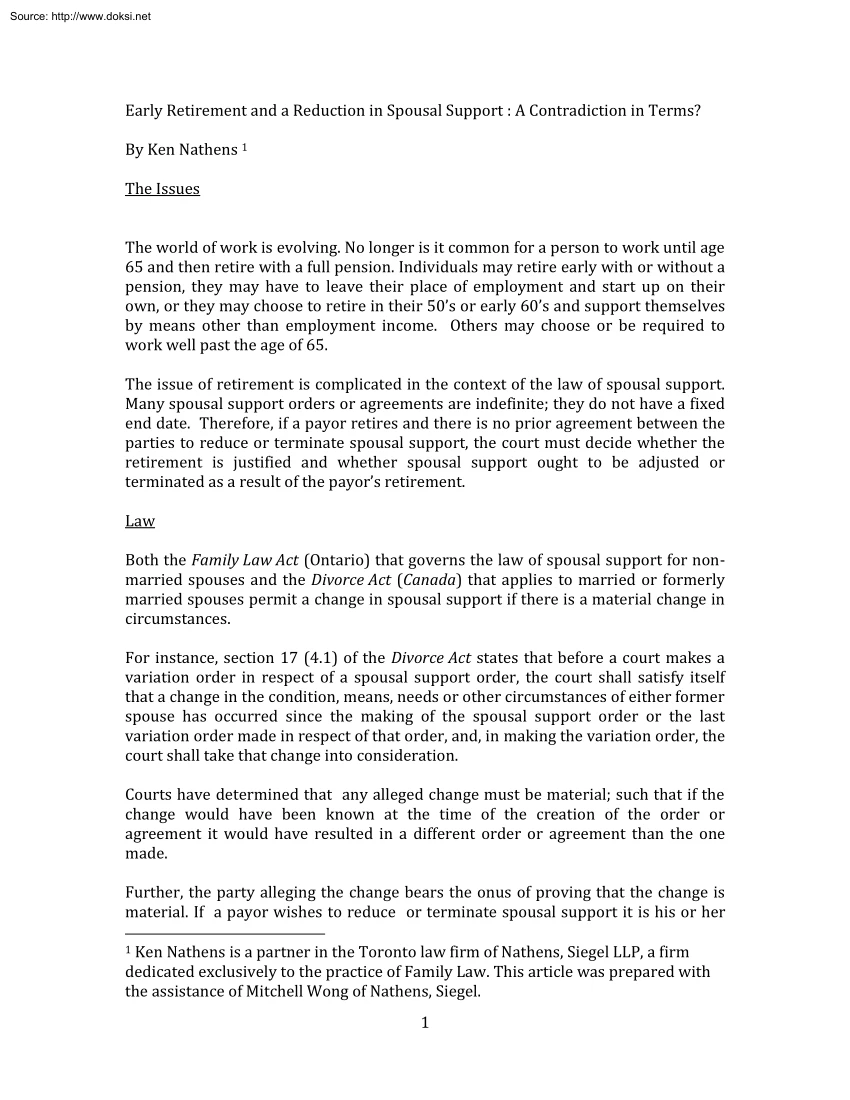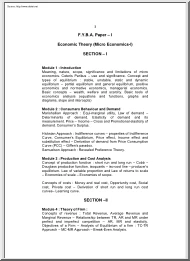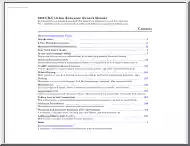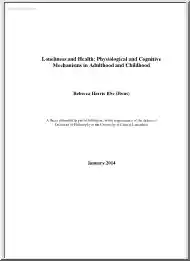Comments
No comments yet. You can be the first!
What did others read after this?
Content extract
Source: http://www.doksinet Early Retirement and a Reduction in Spousal Support : A Contradiction in Terms? By Ken Nathens 1 The Issues The world of work is evolving. No longer is it common for a person to work until age 65 and then retire with a full pension. Individuals may retire early with or without a pension, they may have to leave their place of employment and start up on their own, or they may choose to retire in their 50’s or early 60’s and support themselves by means other than employment income. Others may choose or be required to work well past the age of 65. The issue of retirement is complicated in the context of the law of spousal support. Many spousal support orders or agreements are indefinite; they do not have a fixed end date. Therefore, if a payor retires and there is no prior agreement between the parties to reduce or terminate spousal support, the court must decide whether the retirement is justified and whether spousal support ought to be adjusted or
terminated as a result of the payor’s retirement. Law Both the Family Law Act (Ontario) that governs the law of spousal support for nonmarried spouses and the Divorce Act (Canada) that applies to married or formerly married spouses permit a change in spousal support if there is a material change in circumstances. For instance, section 17 (4.1) of the Divorce Act states that before a court makes a variation order in respect of a spousal support order, the court shall satisfy itself that a change in the condition, means, needs or other circumstances of either former spouse has occurred since the making of the spousal support order or the last variation order made in respect of that order, and, in making the variation order, the court shall take that change into consideration. Courts have determined that any alleged change must be material; such that if the change would have been known at the time of the creation of the order or agreement it would have resulted in a different order or
agreement than the one made. Further, the party alleging the change bears the onus of proving that the change is material. If a payor wishes to reduce or terminate spousal support it is his or her Ken Nathens is a partner in the Toronto law firm of Nathens, Siegel LLP, a firm dedicated exclusively to the practice of Family Law. This article was prepared with the assistance of Mitchell Wong of Nathens, Siegel. 1 1 Source: http://www.doksinet obligation to show that given the circumstances, he or she is no longer able to maintain the required support payments. Factors Used to Determine Whether Retirement Constitutes a Material Change in Circumstances There is a high threshold to prove that retirement is justified and that a support payment ought to be reduced or terminated as a result of retirement. As stated in Bullock v. Bullock 2« A support payor cannot choose to be voluntarily unemployed, whether by retirement or otherwise and thereby avoid his or her spousal support payment
obligations. » Courts will review the following factors (amongst others) to determine if a payor’s retirement justifies the reduction or elimination of spousal support : 1. The age of the payor Canada does not have a mandated retirement age The normal retirement age is 65, the age when one is able to claim unreduced Canada Pension Plan payments. Therefore retirement before age 65 will be subject to particular scrutiny by the courts. However, even those age 65 and older may not qualify for a reduction or elimination of spousal support on retirement absent one or more of the additional factors set out on this list. 2. The health of the payor and recipient If a payor is required to retire for health reasons that are well documented, the Court will likely permit the requested variation in spousal support. 3. The relative financial circumstances of both parties One purpose of spousal support is to help ensure that both parties are able to accumulate sufficient retirement savings to keep
both former spouses at reasonable standards of living. 3 If the Recipient has not saved sufficient funds for retirement and is not able to support herself or himself on retirement, this will be a relevant factor for the Court’s consideration in determining the reasonableness of the payor’s decision to retire. 4. Length of time that spousal support has been paid Indefinite spousal support does not necessarily obligate the payor to work full time forever. For instance, in the case of Nye v. Nye,4 the Court took into account that the 66 year old payor had paid spousal support for 20 years at the time of the Bullock v. Bullock, 2004 Can Law II 19649 at paragraph 13 (Ontario Superior Court) 3 Cossette v. Cossette, 2015 ONSC 2678 (Ontario Divisional Court) 4 Nye v. Nye 2016 ONSC 1853(Ontario Superior Court) 2 2 Source: http://www.doksinet support variation application as partial justification of the decsion to permit a support variation. 5. Good Faith : If it is determined that a
payor’s choice to retire is motivated in whole or in part by the Payor’s desire to reduce or eliminate spousal support then the chances of success on a varation application will be greatly diminished. Examples In Bullock v. Bullock, the payor’s application to reduce or terminate spousal support was rejected. The payor was 62 years old at the time of the application. The payor argued he was no longer able to maintain his business due to financial circumstances. The Court determined that the payor had made no serious efforts to find alternate employment nor earn additional income. The evidence showed that it was the payor’s plan to close his business and live off his second wife’s income. The retirement of the payor was found to be voluntary and unnecessary. In Cossette v. Cossete, the Court determined that the payor’s retirement did not constitute a material change in circumstances for the payment of spousal support. The payor was not able to provide documentary evidence to
support the claim that retirement was medically necessary. The Court determined that the retirement was voluntarily and was based in part on the payor’s desire to stop paying spousal support. In Nye v. Nye, the court ordered the reduction in the amount of spousal support. In this case, the Payor was 66 years old There was sufficient medical evidence to support that the payor suffered from poor health that affected his ability to work. The payor was not motivated by early retirement to avoid the payment of spousal support. The Court determined that the payor’s decision to retire was a reasonable one. The Lesson : Early Retirement is a Risky Proposition Support payors cannot assume that he or she will be permitted to reduce or eliminate a spousal support obligation on retirement. Before a court permits the reduction or termination of spousal support as a result of retirement, it will make very specific inquiries as to the reasonableness of the retirement decision in the particular
circumstances of the case. In fields where early retirement is common (such as teachers, fire fighters, police officers etc) there is still the expectation that support payments will continue to be paid if the reduction in the payor’s income is voluntary. Even those age 65 or older may still be required to work full time in order to pay spousal support if he or she is able to do so, however, the Court appears to permit greater flexibility regarding retirment for those aged 65 or older. 3 Source: http://www.doksinet Before any unilateral decisions to retire are made, competent legal advice must be obtained. If possible, an agreement should be worked out between payors and recipients in order to avoid the necessity, uncertainty, and expense of a court application. 4
terminated as a result of the payor’s retirement. Law Both the Family Law Act (Ontario) that governs the law of spousal support for nonmarried spouses and the Divorce Act (Canada) that applies to married or formerly married spouses permit a change in spousal support if there is a material change in circumstances. For instance, section 17 (4.1) of the Divorce Act states that before a court makes a variation order in respect of a spousal support order, the court shall satisfy itself that a change in the condition, means, needs or other circumstances of either former spouse has occurred since the making of the spousal support order or the last variation order made in respect of that order, and, in making the variation order, the court shall take that change into consideration. Courts have determined that any alleged change must be material; such that if the change would have been known at the time of the creation of the order or agreement it would have resulted in a different order or
agreement than the one made. Further, the party alleging the change bears the onus of proving that the change is material. If a payor wishes to reduce or terminate spousal support it is his or her Ken Nathens is a partner in the Toronto law firm of Nathens, Siegel LLP, a firm dedicated exclusively to the practice of Family Law. This article was prepared with the assistance of Mitchell Wong of Nathens, Siegel. 1 1 Source: http://www.doksinet obligation to show that given the circumstances, he or she is no longer able to maintain the required support payments. Factors Used to Determine Whether Retirement Constitutes a Material Change in Circumstances There is a high threshold to prove that retirement is justified and that a support payment ought to be reduced or terminated as a result of retirement. As stated in Bullock v. Bullock 2« A support payor cannot choose to be voluntarily unemployed, whether by retirement or otherwise and thereby avoid his or her spousal support payment
obligations. » Courts will review the following factors (amongst others) to determine if a payor’s retirement justifies the reduction or elimination of spousal support : 1. The age of the payor Canada does not have a mandated retirement age The normal retirement age is 65, the age when one is able to claim unreduced Canada Pension Plan payments. Therefore retirement before age 65 will be subject to particular scrutiny by the courts. However, even those age 65 and older may not qualify for a reduction or elimination of spousal support on retirement absent one or more of the additional factors set out on this list. 2. The health of the payor and recipient If a payor is required to retire for health reasons that are well documented, the Court will likely permit the requested variation in spousal support. 3. The relative financial circumstances of both parties One purpose of spousal support is to help ensure that both parties are able to accumulate sufficient retirement savings to keep
both former spouses at reasonable standards of living. 3 If the Recipient has not saved sufficient funds for retirement and is not able to support herself or himself on retirement, this will be a relevant factor for the Court’s consideration in determining the reasonableness of the payor’s decision to retire. 4. Length of time that spousal support has been paid Indefinite spousal support does not necessarily obligate the payor to work full time forever. For instance, in the case of Nye v. Nye,4 the Court took into account that the 66 year old payor had paid spousal support for 20 years at the time of the Bullock v. Bullock, 2004 Can Law II 19649 at paragraph 13 (Ontario Superior Court) 3 Cossette v. Cossette, 2015 ONSC 2678 (Ontario Divisional Court) 4 Nye v. Nye 2016 ONSC 1853(Ontario Superior Court) 2 2 Source: http://www.doksinet support variation application as partial justification of the decsion to permit a support variation. 5. Good Faith : If it is determined that a
payor’s choice to retire is motivated in whole or in part by the Payor’s desire to reduce or eliminate spousal support then the chances of success on a varation application will be greatly diminished. Examples In Bullock v. Bullock, the payor’s application to reduce or terminate spousal support was rejected. The payor was 62 years old at the time of the application. The payor argued he was no longer able to maintain his business due to financial circumstances. The Court determined that the payor had made no serious efforts to find alternate employment nor earn additional income. The evidence showed that it was the payor’s plan to close his business and live off his second wife’s income. The retirement of the payor was found to be voluntary and unnecessary. In Cossette v. Cossete, the Court determined that the payor’s retirement did not constitute a material change in circumstances for the payment of spousal support. The payor was not able to provide documentary evidence to
support the claim that retirement was medically necessary. The Court determined that the retirement was voluntarily and was based in part on the payor’s desire to stop paying spousal support. In Nye v. Nye, the court ordered the reduction in the amount of spousal support. In this case, the Payor was 66 years old There was sufficient medical evidence to support that the payor suffered from poor health that affected his ability to work. The payor was not motivated by early retirement to avoid the payment of spousal support. The Court determined that the payor’s decision to retire was a reasonable one. The Lesson : Early Retirement is a Risky Proposition Support payors cannot assume that he or she will be permitted to reduce or eliminate a spousal support obligation on retirement. Before a court permits the reduction or termination of spousal support as a result of retirement, it will make very specific inquiries as to the reasonableness of the retirement decision in the particular
circumstances of the case. In fields where early retirement is common (such as teachers, fire fighters, police officers etc) there is still the expectation that support payments will continue to be paid if the reduction in the payor’s income is voluntary. Even those age 65 or older may still be required to work full time in order to pay spousal support if he or she is able to do so, however, the Court appears to permit greater flexibility regarding retirment for those aged 65 or older. 3 Source: http://www.doksinet Before any unilateral decisions to retire are made, competent legal advice must be obtained. If possible, an agreement should be worked out between payors and recipients in order to avoid the necessity, uncertainty, and expense of a court application. 4





